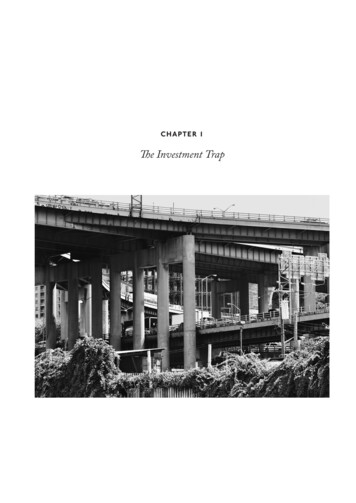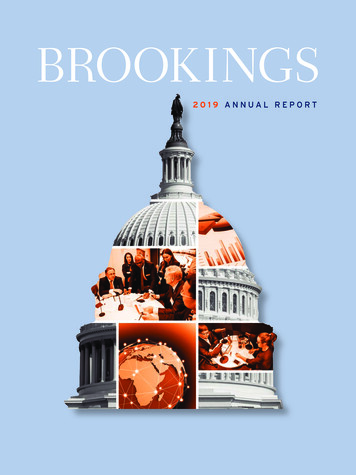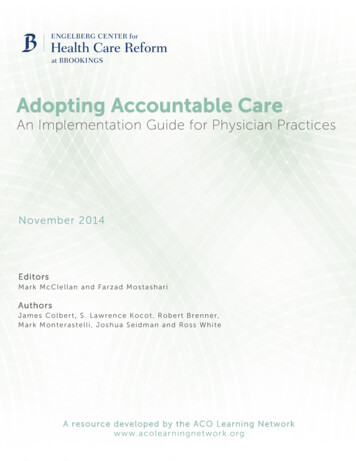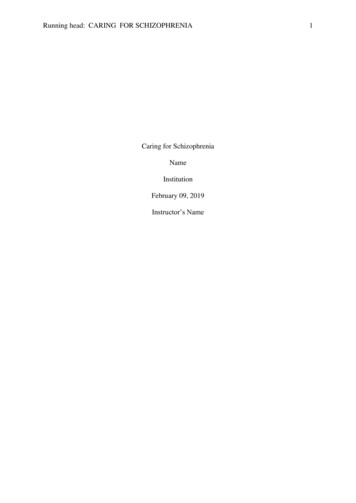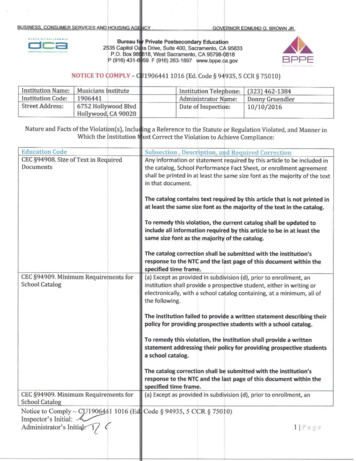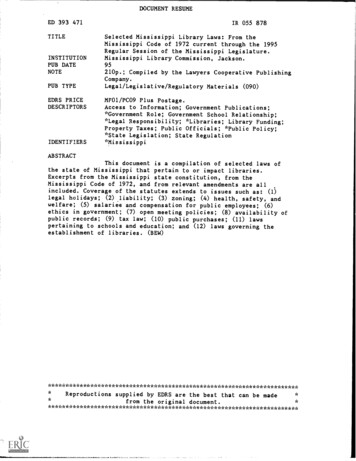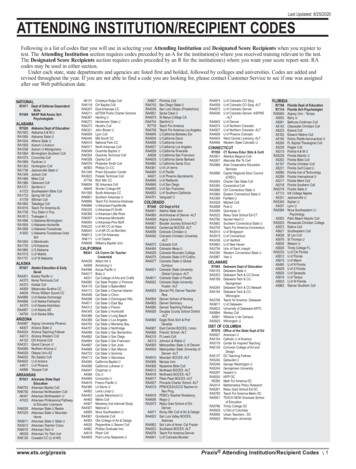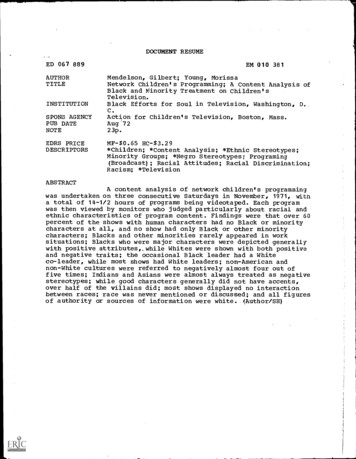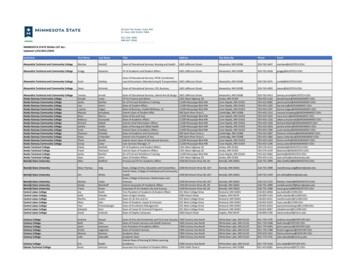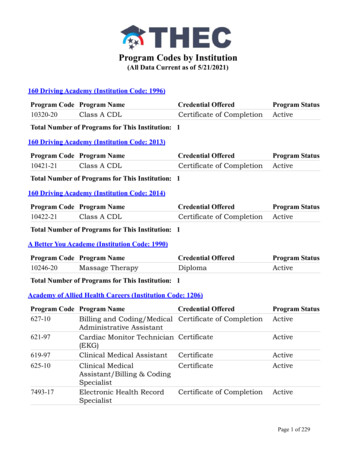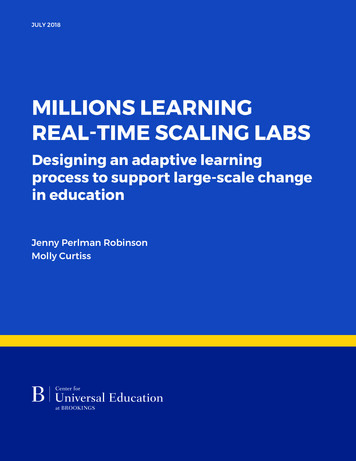
Transcription
JULY 2018MILLIONS LEARNINGREAL-TIME SCALING LABSDesigning an adaptive learningprocess to support large-scale changein educationJenny Perlman RobinsonMolly Curtiss
Jenny Perlman Robinson is a fellow at the Center for Universal Education at BrookingsMolly Curtiss is a research analyst at the Center for Universal Education at BrookingsAcknowledgementsThis report was written by Jenny Perlman Robinson and Molly Curtiss, with invaluable assistance fromthe team at the Brookings Institution Center for Universal Education, particularly: David Batcheck, SaraCoffey, David Eckmann, and Rebecca Winthrop, and Larry Cooley, senior advisor with Millions Learning.We appreciate the continued guidance and support from our Millions Learning Advisory Group, chairedby the Honorable Julia Gillard, 27th Prime Minister of Australia, Chair of the Board, Global Partnership forEducation, and Distinguished Fellow at the Center for Universal Education at the Brookings Institution.We are especially grateful to the more than 80 individuals who generously gave their time and valuableinput into various drafts of the design of the lab (see full lists in Annex 1 and 2).The Brookings Institution is a nonprofit organization devoted to independent research and policysolutions. Its mission is to conduct high-quality, independent research and, based on that research, toprovide innovative, practical recommendations for policymakers and the public. The conclusions andrecommendations of any Brookings publication are solely those of its author(s), and do not reflect theviews of the Institution, its management, or its other scholars.Brookings gratefully acknowledges the support provided by the International Development ResearchCentre, EAFIT University, and the Jacobs Foundation.Brookings recognizes that the value it provides is in its absolute commitment to quality, independence,and impact. Activities supported by its donors reflect this commitment.iMILLIONS LEARNING REAL-TIME SCALING LABS
Table of ContentsMillions Learning Real-time Scaling Lab overview Objectives of Real-time Scaling Labs 12Development of overarching lab methodology Background research on collective impact and adaptive implementation Input and feedback from experts and advisors 336Recommendations on design of Real-time Scaling Labs Overview Research focus of the scaling labs Criteria for lab selection Lab roles and participants Communications tools Measures of success 881718191921Endnotes 24Annex 1: Experts and in-country stakeholders consulted on Real-time Scaling Labapproach and methodology Annex 2: Millions Learning 2.0 Advisory Group members Annex 3: Millions Learning Real-time Scaling Lab theory of change Annex 4: Millions Learning 14 core ingredients 25283031Boxes, Figures, and TablesBox 1. ScalingBox 2. Core principles of Real-time Scaling LabsFigure 1. Three components of scaling labsFigure 2. Real-time Scaling Lab iterative learning cycleFigure 3. Generic timeline for the Real-time Scaling LabTable 1. Real-time Scaling Lab step-by-step approachDESIGNING AN ADAPTIVE LEARNING PROCESS TO SUPPORT LARGE-SCALE CHANGE IN EDUCATION14291710ii
Millions LearningReal-time Scaling LaboverviewMillions Learning,1 a project of the Center forUniversal Education (CUE)2 at the BrookingsInstitution, addresses the question of how toscale quality education for all children andyouth. CUE is launching Real-time ScalingLabs in partnership with local institutionsin a number of countries and U.S. cities togenerate more evidence and provide practical recommendations around the processof scaling in global education, encouraginga stronger link between research and practice. These labs are not physical spaces, butrather a process established by CUE andpartner institutions to learn from, support,and document existing efforts to scale interventions focused on improving children’slearning as they unfold in real-time. This willinclude observing, gathering, and analyzingdata, as well as encouraging self-reflection,recommending course corrections based onexisting evidence, documenting the scalingprocess in real-time, and sharing ongoinglearning with those involved. The ultimategoal is to support initiatives as they scalewhile simultaneously gaining deeper insightinto how policymakers, civil society, andthe private sector can most effectively worktogether to bring about large-scale transformation in the quality of children’s learningand their development.The impetus for the Real-time Scaling Labs—and overarching problem statement—is that1MILLIONS LEARNING REAL-TIME SCALING LABSas we look at the education landscape ofinnovations working at a local level, it oftendoes not translate to the systemic changeneeded to solve the global learning crisis.While there is growing evidence aroundwhich educational strategies improve children’s learning, we know much less abouthow to translate this into improved policiesand practices at scale. CUE believes thatthis requires a combination of technical andpolitical strategies to scale evidence-basedinterventions, mechanisms to accelerate theadoption of new practices, and strengthening local capacity for successful adaptionand scale.Within and across each of the labs, CUE willdraw lessons to better unpack and understand the scaling process, using these lessonsto feedback directly into the initiatives particBOX 1. ScalingCUE uses the term “scaling” broadlyto represent a range of approaches—from deliberate replication toorganic diffusion to integration intonational systems—that expand anddeepen impact leading to lastingimprovements in people’s lives.
ipating in the labs, as well as contributing tobuilding a more robust, actionable evidencebase on scaling globally. More specifically,each of the labs will explore what technicaland political considerations need to be addressed, and how they have been addressed,to expand the impact of quality educationinitiatives. This will include developing toolstargeted for policymakers, practitioners, andfunders to offer practical guidance on howbest to scale evidenced-based approachesin education.FIGURE 1. Three components of scaling labsLearnSupportDocumentObjectives of Real-timeScaling Labs1. Strengthen scaling efforts through aforum for peer-to-peer learning in whichlab participants discuss lessons learnedand develop strategies to address challenges faced during their educationinterventions’ scaling journey.2. Provide ongoing evidence-based guidance to lab participants, includingpractitioners and policymakers, on howto identify, adapt, and expand effectiveapproaches to scaling education interventions. Guidance will be drawn fromthe report Millions Learning: Scaling upquality education in developing countries3 and other scaling resources andtools in education and other disciplines.3. Document participants’ scaling experiences in real-time to feed back into arapid and iterative learning cycle, as wellas into the development of global publicgoods for scaling in education.4. Study modes of communication andcollaboration among lab participants asa potential model for reflective learningand knowledge sharing generally.5. Identify mechanisms and approachesfor connecting those innovating in education delivery with those designing andimplementing policies and programs.6. Identify gaps in the scaling evidencebase and areas for further research.DESIGNING AN ADAPTIVE LEARNING PROCESS TO SUPPORT LARGE-SCALE CHANGE IN EDUCATION2
Development ofoverarching labmethodologyBackground research oncollective impact andadaptive implementationResearch in the first stage of Millions Learning identified that efforts to improve learning outcomes at scale could benefit from astructured, neutral space for those involvedto exchange knowledge and learn fromone another about efforts to scale or affectlarge-systems change and to incorporatelearnings into ongoing work and make necessary adjustments along the way.4CUE began designing plans for the Real-time Scaling Labs by conducting an extensive literature review on collective impactand adaptive learning mechanisms, such aslearning loops, innovation labs, hubs, accelerators, and delivery teams. This was followedby a global scan of almost 200 existingmechanisms, spanning non-profit, government, private sector, and social enterpriseinitiatives across multiple sectors, includingeducation, social policy, energy, technology,poverty reduction, and public health. Thepurpose of this literature review and scan ofexisting initiatives was to identify relevanttheory, approaches, and specific initiatives tolearn from and collaborate with, as well as toidentify specific gaps where CUE could addvalue.3MILLIONS LEARNING REAL-TIME SCALING LABSCUE found that there is a global burgeoningof mechanisms and infrastructure that bringtogether multi-sectoral actors to generatesolutions to complex, social problems of asystemic nature, within technology, governance, health, and other sectors. Despitetheir proliferation, however, few of thesecollective impact mechanisms have a deliberate focus on scaling, a clear area where thescaling labs can add value. Within the groupexamined, there is a large amount of diversity in terms of sector, focus, membership,funding, etc., suggesting that there is notone single blueprint or approach. However,a significant portion of the initiatives sharecore elements, in particular systemic thinking, applied orientation, user-centered, andrapid iterative testing cycles. Finally, very fewof these mechanisms had rigorous data ontheir effectiveness.Building off this work, CUE also conductedresearch on a wide range of methodologiesand approaches, drawing not only from theprinciples commonly employed in existingcollective impact mechanisms but also fromcontinuous learning and adaptive programming more broadly. This included researchinto systems thinking, improvement science,Problem-Driven Iterative Adaptation (PDIA),change management, implementationscience, and design thinking, amongstother approaches. Emerging research and
practical experience suggest that the mosteffective approaches to addressing complex,developmental challenges, such as delivering quality education, combine three keyprinciples: problem-driven and politicallyinformed; adaptive and entrepreneurial; andsupporting change that reflects local realitiesand is locally led.5 A number of the methodologies focus specifically on identifying andaddressing root causes of complex systemicchallenges, tailoring solutions to the localcontext, and utilizing experiential learningto adjust and make course corrections inreal-time.Drawing from the existing mechanismsand relevant literature discussed above andinformed by previous analysis undertakenfor the report Millions Learning: Scaling upquality education in developing countries,input from policymakers, practitioners,funders, and researchers from around theworld, and consultations in more than 10countries, CUE developed an overarching,flexible methodology for the Real-time Scaling Labs. More specifically, CUE comparedand contrasted the above approaches aswell as the key tenets of collective impactand applied learning mechanisms, identified core principles, and adapted them intoa methodology that aligns with the aims andcontext of the Millions Learning project andfocuses more centrally on questions of scaling. Many of these methods and approacheshave previously been applied to finding asolution to a problem, while the labs willfocus on scaling a solution to a problem.BOX 2. Core principles of Real-time Scaling Labs Problem-driven and user-centered: The primary purpose of the scaling labs is toaddress pressing issues or bottlenecks that policymakers and practitioners face inscaling effective education interventions. To do this, it is critical that the process isfocused on addressing issues identified by local stakeholders as high priority, ratherthan on implementing pre-determined solutions that do not address local priorities.6 As discussed in PDIA, too often reformers import an external “best practice”intervention, without giving adequate consideration to the particulars of the localcircumstances or to the underlying causes of the problem they are trying to solve,and then fail to see the results they hoped to achieve.7 In response to this, the labapproach will be problem-driven and user-centered, starting by identifying concrete challenges to address that are deeply felt by the participants, led by the keylocal stakeholders who are close to the problem, understand it best, and are mostincentivized to find a solution. Taking a problem-driven, user-centered approachcan help control for what the Carnegie Foundation for the Advancement of Teaching calls “solutionitis”—the impulse to lead with a preconceived solution before fullyunderstanding the problem to be solved.8 Systems approach: The scaling labs will be grounded in systems thinking, or ana-lyzing systems as a whole as well as the interplay of relationships within them rather than examining the individual components independently. Drawing from theimprovement science mantra that “every system is perfectly designed to achieveexactly the results it gets,”9 one must understand the larger system if seeking toDESIGNING AN ADAPTIVE LEARNING PROCESS TO SUPPORT LARGE-SCALE CHANGE IN EDUCATION4
achieve different outcomes or results. Similarly, the scaling labs will begin by convening a diverse group of stakeholders to discuss and assess the nature of the problem the intervention(s) seeks to address and the system that produces it. By takinga systems approach, participants will better understand and address the processesand mechanisms within the system that are hindering the type of improvementsought and to tackle the underlying causes behind the problems they are tryingto solve. As Roy Steiner argues, “Simple solutions that don’t take a systems viewinto account often result in unintended negative consequences instead of durablechange.”10 Multi-stakeholder participation: Addressing complex challenges of a systemic na-ture requires the participation of actors across sectors and disciplines. The scalinglabs recognize the importance of bringing together stakeholders with a diversityof perspectives and experiences in order to identify and address what are oftenstructural barriers hindering scaling. As no one person can see the whole system,engaging a variety of different stakeholders with multiple perspectives helps toaddress the underlying causes within the larger system. Adaptive orientation: Today’s rapidly changing and uncertain world requires adap-tive learners, institutions, and systems that readily learn, adjust, and evolve. The scaling labs recognize that just because an intervention has worked in one educationsystem, does not mean it will have the same positive impact in every educationsystem. Therefore, education reformers need to employ adaptive and innovativeapproaches to tailor solutions to fit in their own context and adapt global best practices to local needs. Research and practical experience find that many interventionsultimately fail because they do not include mechanisms to address problems as theyarise.11 And given the complexity of most development challenges, there needs tobe room for trial and error as well as flexible adaptation and course-correction.12 Yet,rigid log frames and evaluation methodologies can prescribe solutions that leavelittle to no room for making adjustments when things start to go wrong. Instead,the Real-time Scaling Labs will experiment with an adaptive learning approach,employing an iterative process of testing, refining, and re-testing change ideas toleverage opportunities and address challenges to scaling. Quick feedback loops: Another critical component of this adaptive learning ap-proach are quick feedback loops, so that lab participants in the process of scalinginterventions can test out ideas, fail quickly, reflect on the learning in real-time(rather than waiting for the end of a project), and use that information to informdecisions and adapt plans. The labs will employ cycles of testing, reflecting, andadapting with quick feedback loops built in, in order to test hypotheses and makechanges throughout the process based on data and the group’s evolving understanding. This includes purposeful opportunities for reflection, which research incognitive psychology and neuroscience has shown can lead to greater learningthan simply acquiring more experience.13 The lab methodology purposefully buildsin routine moments for reflection on the scaling process, with the opportunity for5MILLIONS LEARNING REAL-TIME SCALING LABS
lab participants to pause from the task of scaling in order to review data, reflecton what has already taken place and why, learn from what has happened thus far,and use that learning to adapt their work moving forward.14 This learning is a criticalelement of an adaptive approach.15 Political and technical considerations: Research and practical experience suggestthat only tackling the technical challenges of expanding education access andquality is not enough; in order to provide millions of children with improved opportunities to learn, it is also essential to understand and address the various factorsoutside of the classroom that determine whether an effective education innovationactually scales.16 As discussed in Millions Learning: Scaling up quality educationin developing countries, it takes a combination of both technical and politicalstrategies to implement effective initiatives at a large-scale.17 Similarly, another coreprinciple of the Real-time Scaling Labs is the focus on identifying and adaptingeducation initiatives and pathways to scale that are politically, economically, financially, and socially feasible within the particular local context. In the initial stageof the lab process, participants will develop or revise scaling plans that take thelocal political economy and context into account, and address both technical andpolitical challenges to the scaling process.Input and feedback fromexperts and advisorsOnce the draft design of the scaling labprocess was created, CUE solicited feedbackfrom a wide variety of experts across disciplines including education, health, agriculture, systems change, continuous learning,and adaptive programming (see Annex 1for a list of individuals consulted), to furtherrefine and develop the lab methodology.Additionally, CUE held four in-person meetings with the Millions Learning high-levelinternational advisory group, chaired by former prime minister of Australia, chair of theGlobal Partnership for Education, and distinguished fellow with the Center for UniversalEducation at Brookings, Hon. Julia Gillard,between March 2017 and May 2018. In thesemeetings, advisors discussed and providedfeedback on plans for the scaling labs, including overall design, research approach,and internal and external communicationsstrategies (see Annex 2 for a list of advisors).CUE incorporated key feedback receivedinto various iterations of the lab approachand methodology, some of which included: the importance of starting the processwith clarity and consensus among labparticipants on the nature of the problem, as well as underscoring the realitythat scaling does not automaticallyhappen but is challenging and must beplanned for from the start; the need to give ample considerationto organizational capacity for scale and,therefore, the importance of institutionallearning in the lab process; the value of exploring opportunities toleverage in the scaling lab process inaddition to examining problems or challenges confronted; the importance of strong informationmanagement systems that allow forDESIGNING AN ADAPTIVE LEARNING PROCESS TO SUPPORT LARGE-SCALE CHANGE IN EDUCATION6
continuous learning balanced with theneed for quick, simple data collectionmethods; the need to build in enough time foriterations and reflections in terms of theoverall timeline of lab process as well asthe necessity to employ tight enoughfeedback loops in between lab convenings that allow for real-time learning; the critical importance of identifyingresources required to scale from the beginning, which will include consideringbudgets available and costs of the intervention as scale; and and the necessity of ensuring the incentives to participate in the lab are clear byclosely linking the learning and supportprovided through the process.CUE also presented the draft framework forinput at international conferences, includingat EAFIT University in Colombia in November2017, The Education University of Hong Kongin January 2018, Harvard University in February 2018, and the Carnegie Foundation forthe Advancement of Teaching’s Summit onImprovement in Education in San Franciscoin April 2018. This input was then incorporated into a final version of the design.The resulting lab approach was designedto provide a common framework for all ofthe Real-time Scaling Labs, while also beingflexible enough to be adapted to the localcontext. As such, for each of the Real-timeScaling Labs, the next step in the lab designprocess includes in-depth research into thelocal context as well as input and feedbackfrom local stakeholders and partners to tailorthe overarching lab approach to the particulars of each individual lab.7MILLIONS LEARNING REAL-TIME SCALING LABS
Recommendations ondesign of Real-timeScaling LabsBased on the background research andconsultations held with key stakeholdersas outlined previously, CUE proposes thefollowing general design for the Real-timeScaling Labs to be tailored to each specificlab in partnership with local stakeholders.OverviewOver the course of three years, the lab process will involve a series of in-person andvirtual convenings and workshops that bringtogether policymakers, practitioners, and adiversity of other stakeholders around a particular education initiative or set of initiativesthat is in the process of scaling. Initial convenings will focus on articulat-ing a shared scaling goal for the intervention and determining the initiative’scurrent place along a scaling pathway,along with identifying opportunitiesand obstacles currently confronted inachieving those scaling goals and progress towards scale. The lab will then support a process fordeveloping and/or refining a scalingaction plan that addresses root causesof the scaling challenges identified andleverages opportunities to acceleratescaling, drawing from the Millions Learning framework and the scaling literature. Participants will put scaling plans intopractice and reconvene periodically forreflection periods, to assess data collected on short-term targets, determinewhat elements should be adjusted,analyze what lessons have been learnedthus far, and evaluate progress along thescaling pathway towards the end goal. Throughout the three years, the lab willemploy an iterative process of testingand refining change ideas to strengthen scaling efforts, which will allow participants to learn from what works andwhat does not work, make adjustmentsto scaling plans, and ultimately progressalong the scaling pathways identifiedwhile also improving capacity to scale.As such, the lab will provide a reflective, neutral space for stakeholders to discuss sharedchallenges and opportunities faced in scaling an education intervention, discover theunderlying causes of those challenges, andidentify and adapt approaches based ondata collected to address these issues, ultimately contributing to improving learningoutcomes for children and youth.Within this lab process, each individualscaling lab will focus primarily on its owneducation initiative(s) and the challengesDESIGNING AN ADAPTIVE LEARNING PROCESS TO SUPPORT LARGE-SCALE CHANGE IN EDUCATION8
FIGURE 2. Real-time Scaling Lab iterative learning cycleDefine scaling pathwayand end goalReconvene forreflection periodPut plan into action,using rapid feedbackmechanisms to learnand adapt in real-timeand opportunities it faces in bringing thatinitiative to scale. However, CUE will also foster opportunities for cross communication,knowledge sharing, and peer-to-peer learning between the labs, through virtual meetings, webinars, and occasional in-personconvenings. Additionally, CUE is interested ingoing deeper into questions that emergedthrough research conducted for the MillionsLearning study and subsequent consultations around the world. Beyond testing theMillions Learning framework and exploringthe various scaling pathways and approaches within each lab, CUE has also identifiedtwo key scaling challenges that each of thelabs will explore in depth. The first focuses oneducation alliances, drawing lessons aroundmobilizing diverse actors from public, private,and social sectors to align around sharedincentives and objectives of improving learning outcomes. The second is around flexible9MILLIONS LEARNING REAL-TIME SCALING LABSIdentify scalingchallenges to address& opportunities toleverageDevelop scaling actionplan, drawing fromMillions Learningframework & otherscaling resourcesadaptation, looking at the critical question ofadapting and scaling an effective approachacross contexts.Throughout the project, CUE will observethe process of implementing, adapting, andscaling the selected interventions via quantitative and qualitative methods, analyzedata on an ongoing basis to identify lessonslearned and challenges confronted duringthe scale up, leverage existing tools andexpertise to help address challenges as theyarise, and recommend course correctionsidentified through the iterative learning process as well as existing evidence and experience from other labs. CUE will documentthe entire process undertaken by the variousactors—from conception to design to implementation to monitoring to outcome—sothat others can continue to build upon whatis learned through each scaling lab. Ongo-
ing lessons learned will be shared betweenthe Real-time Scaling Labs in each locationthrough in-person and virtual exchanges,including two global convenings that willbring together representatives from all ofthe scaling labs twice during the three-yearperiod.At the end of the project, CUE will produce apolicy report that tells the story of the design,implementation, adaptation, and scaling ofthe intervention(s) and broader efforts to collectively strengthen education ecosystems.It will also serve as a model of collaborativelearning and collective action, includingwhat strategies can be used to develop acoherent approach engaging multiple ac-tors to achieve large-scale systems change.Additionally, the publication will provide recommendations about how best to foster thetransformational change urgently needed ineducation—identifying mechanisms and approaches that connect those innovating ineducation delivery with those designing andimplementing policies, in conjunction withevidence about scaling, and affecting broadsystems change. CUE will also develop toolstargeted for policymakers, practitioners, andfunders to offer practical guidance on howbest to scale evidenced-based approaches.TABLE 1. Real-time Scaling Lab step-by-step approachStepDetailsTools (notexhaustive)Pre-Lab ActivitiesTailor generallab methodology andapproach tolocal contextin collaboration with localpartnersCUE will work with partners to adapt the general lab approach to thelocal context. This will include a series of calls and meetings with labstakeholders and partners to get ongoing feedback on design of labprocess, tailor materials to meet participants’ expectations and needs,and build consensus and buy-in prior to official launch of the lab.Hire in-country facilitatorand documenterCUE and the local partner institution will hire two local, part-timeconsultants to work on the ground throughout the lab process. Thedocumenter will be responsible for capturing the details and data ofhow the initiatives scaled and how the lab approach functioned andsupported the scaling process, while the facilitator will be responsiblefor guiding the in-person and virtual convenings.Conductbackgroundresearch insupport of thelab processCUE will conduct background research to inform each scaling lab,which may include landscape analysis, stakeholder mapping, scopingpieces on particular issues, etc. Generic stepby-step labapproach Stakeholdermapping Landscapeanalysis Political economy analysisDESIGNING AN ADAPTIVE LEARNING PROCESS TO SUPPORT LARGE-SCALE CHANGE IN EDUCATION10
StepDetailsSelect labparticipantsCUE and local partner institution will identify and invite approximately20-25 key stakeholders involved in scaling the selected initiative,representing a diversity of sectors and perspectives (including representatives from government, civil society, private sector, etc.), to participatein the lab process. This will include a mix of high-level representativesalong with those directly responsible for implementation of policiesand programs. Ideally the same individuals will participate in the entirethree year process.Clarify theeducationproblem andinterventionthat will bethe focus ofthe labWhile the overall lab process will be problem-driven, focused onidentifying and addressing challenges faced in the process of scaling,the starting point for each lab will be to identify an evidenced-basededucation initiative (or set of initiatives) in the process of scaling thatthe lab will focus on and to ensure that all key stakeholders engaged inthe lab have a common understanding of the nature and scope of theproblem that the intervention(s) seeks to address.Globalfacilitator &documentertrainingCUE will organize a multi-day, in-person training of facilitators anddocumenters involved with each of the Real-time Scaling Labs. Trainingwill provide the opportunity to become familiar with lab design, research protocol, methodology, communications and data platform, anddata collection tools, ensuring consistent and systemic data collection,analysis, and facilitation of lab convenings.Tools (notexhau
Annex 4: Millions Learning 14 core ingredients 31 Boxes, Figures, and Tables Box 1. Scaling 1 Box 2
